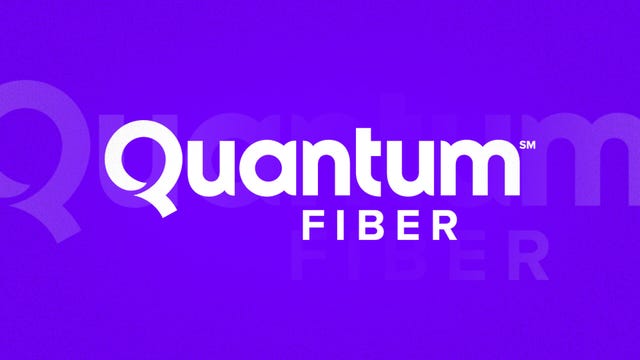What is the best internet provider in St. Paul?
Quantum Fiber is the best internet provider for most people in St. Paul. It offers fast, symmetrical speeds at a reasonable price, and you won’t have to worry about equipment fees, data caps or contracts. The downside: It’s only available to about half of St. Paul residents, but Xfinity and T-Mobile are both solid backup options.
Xfinity has the cheapest internet in St. Paul by a mile, with plans starting at just $20 a month. That said, prices increase significantly after one or two years (or both), and some plans require a contract to get the lowest price. If those caveats sound like they’re not worth the headache, T-Mobile offers a refreshingly simple option: one plan for $50 a month with no price increases, hidden fees or data caps.
Best internet in St. Paul, Minnesota
Quantum Fiber
Best internet provider in St. Paul
Price range
$50 – $165 per month
Speed range
500 – 8,000Mbps
Connection
Fiber
Key Info
Unlimited data, no contracts, equipment included
Quantum Fiber, CenturyLink’s fiber internet brand, is the best option for St. Paul residents looking for fast, reliable and cost-effective broadband service. All Quantum Fiber plans have symmetrical upload and download speeds, making it a great option for remote workers, online gamers or any household with a lot of streaming or video calls. The ISP received the second-highest rating in the most recent American Customer Satisfaction Index report, and Quantum Fiber customers in the St. Paul subreddit report fast and reliable service overall.
Availability: Quantum Fiber is available to 48% of households in St. Paul, with the highest coverage in the west and north sides of the city.
Plans and pricing: There are two Quantum Fiber plans available in St. Paul: 500Mbps upload and download for $50 per month, and 940/940Mbps for $75.
Fees and service details: Both Quantum Fiber plans come with unlimited data and don’t require a contract to get the lowest price. Wi-Fi equipment is also included in both plans at no extra cost.
Read our Quantum Fiber/CenturyLink review.
Xfinity
Cheapest internet in St. Paul
Price range
$20 – $300 per month
Speed range
75 – 6,000Mbps
Connection
Cable
Key Info
Data caps on some plans, lots of plan options, solid customer satisfaction numbers
If you can’t get Quantum Fiber at your address, Xfinity offers an affordable backup option. There is one major caveat: Prices increase significantly after a year or two on all Xfinity plans. Still, the cable internet provider scored two points above the industry average in the most recent American Customer Satisfaction Index report and finished above average in St. Paul’s region in J.D. Power’s provider satisfaction survey.
Availability: 99% of St. Paul households have access to Xfinity internet service.
Plans and pricing: Xfinity offers six internet plans in St. Paul, ranging from $20 per month ($51 if you opt for no contract) for 75/10Mbps to $70 for 1,200/35Mbps. After two years, prices increase by $23 to $33 each month.
Fees and service details: Some Xfinity plans have a monthly data cap of 1.2TB. Equipment rental adds $15 monthly, but this is waived on all but the cheapest plan. A subscription to Peacock Premium is also included with both of Xfinity’s gigabit-speed plans.
Read our Xfinity Internet review.
T-Mobile Home Internet
Best fixed wireless internet in St. Paul
Price range
$50 per month ($30 for eligible mobile customers)
Speed range
72 – 245Mbps
Connection
Fixed wireless
Key Info
Unlimited data, equipment included, no contracts, no additional fees
T-Mobile’s home internet service is a nice alternative to wired connections from Quantum Fiber and Xfinity. It doesn’t hit the same fast speeds — T-Mobile tops out around 245Mbps — but its simple, no-increases-ever pricing is attractive to anyone who’s ever been stuck in a relationship with an ISP they hated. The American Customer Satisfaction Index also gave T-Mobile the highest approval rating of any nonfiber provider in the country.
Availability: 77% of St. Paul households can get internet through T-Mobile.
Plans and pricing: T-Mobile Home Internet offers one plan for $50 a month with download speeds up to 245Mbps and upload speeds up to 31Mbps.
Fees and service details: There are no equipment fees, data caps or contracts with T-Mobile, and your price is locked in for as long as you remain a customer. You can also save an additional $20 monthly by bundling with an eligible T-Mobile cellphone plan.
Read our T-Mobile Home Internet review.
St. Paul internet providers compared
| Provider | Internet technology | Monthly price range | Speed range | Monthly equipment costs | Data cap | Contract | CNET review score |
|---|---|---|---|---|---|---|---|
| Quantum Fiber | Fiber | $50-$75 | 500-940Mbps | None | None | None | 6.7 |
| T-Mobile Home Internet | Fixed wireless | $50 ($30 with eligible mobile plans) | 72-245Mbps | None | None | None | 7.4 |
| Verizon 5G Home Internet | Fixed wireless | $50-$70 ($35-$45 for eligible Verizon Wireless customers) | 85-1,000Mbps | None | None | None | 7.2 |
| Xfinity | Cable | $20-$70 | 75-1,200Mbps | $15 (included on most plans) | 1.2TB on some plans | Optional | 7 |
Source: CNET analysis of provider data.
Other available internet providers in St. Paul
- Nextera Communications: Nextera offers fixed wireless internet in St. Paul, but it’s an undesirable combination of expensive and slow. Plans start at $125 a month for just 10/3Mbps speeds — and that’s with a two-year contract. Another minor annoyance: Nextera makes you fill out a form to see what its plans cost and you’ll have to wait for it to email you back to find out. This is one of the rare situations where I’d go with a satellite provider instead.
- Satellite internet: You can technically get satellite internet from HughesNet and Viasat everywhere in St. Paul, but I’d only recommend it if your only other option is Nextera. Both ISPs have slow speeds, steep prices and data caps that make things like streaming TV and working from home unrealistic. SpaceX’s Starlink satellite internet gives you faster speeds, but it’s expensive at $120 per month for service, plus $599 upfront for the equipment.
- Verizon 5G Home Internet: Like T-Mobile, Verizon 5G Home Internet uses its mobile network to offer home internet services in St. Paul. It’s not as widely available in the city as T-Mobile, but it reaches faster speeds and you can save by bundling with an eligible Verizon cellphone plan.
Cheap internet options in St. Paul
Residents of St. Paul can expect to find a range of internet prices between $20 and $70 per month. That is a much lower starting price than most cities offer, and it’s thanks to Xfinity’s dirt-cheap Connect and Connect More plans. In the third year, these prices increase to $51 and $63, respectively.
What’s the cheapest internet plan in St. Paul?
Show more (2 items)
Source: CNET analysis of provider data.
How to find internet deals and promotions in St. Paul
The best internet deals and the top promotions in St. Paul depend on what discounts are available during that time period. Most deals are short-lived, but we look frequently for the latest offers.
St. Paul internet providers such as Xfinity may offer lower introductory pricing or streaming add-ons for a limited time. Many, however, including Quantum Fiber, T-Mobile and Verizon, run the same standard pricing year-round.
For a more extensive list of deals, check out our guide on the best internet deals.
How fast is St. Paul broadband?
According to Ookla speed test data, St. Paul ranks 89th out of the 100 most populous cities in the US when it comes to internet speed. Residents experience median speeds of 160Mbps download and 20Mbps upload in the city, with Xfinity being the fastest provider. That’s actually slightly higher than neighboring Minneapolis, which ranks 93rd.
Fastest internet plans in St. Paul
Source: CNET analysis of provider data.
What’s a good internet speed?
Most internet connection plans can now handle basic productivity and communication tasks. If you’re looking for an internet plan that can accommodate videoconferencing, streaming video or gaming, you’ll have a better experience with a more robust connection. Here’s an overview of the recommended minimum download speeds for various applications, according to the Federal Communications Commission. Note that these are only guidelines — and that internet speed, service and performance vary by connection type, provider and address.
For more information, refer to our guide on how much internet speed you really need.
- 0 to 5Mbps allows you to tackle the basics — browsing the internet, sending and receiving email, streaming low-quality video.
- 5 to 40Mbps gives you higher-quality video streaming and videoconferencing.
- 40 to 100Mbps should give one user sufficient bandwidth to satisfy the demands of modern telecommuting, video streaming and online gaming.
- 100 to 500Mbps allows one to two users to engage in high-bandwidth activities like videoconferencing, streaming and online gaming simultaneously.
- 500 to 1,000Mbps allows three or more users to engage in high-bandwidth activities simultaneously.
How CNET chose the best internet providers in St. Paul
Internet service providers are numerous and regional. Unlike the latest smartphone, laptop, router or kitchen tool, it’s impractical to personally test every internet service provider in a given city. So what’s our approach? For starters, we tap into a proprietary database of pricing, availability and speed information that draws from our own historical ISP data, partner data and mapping information from FCC.gov.
This guide leverages an in-house artificial intelligence tool called RAMP, which is trained on our own writing and uses our database to generate content about specific internet service providers that our writers can use in determining and presenting our picks for a given guide. Check CNET’s AI policy for more information about how our teams use (and don’t use) AI tools.
Because our database is not exhaustive, we go to the FCC’s website to check the primary data for ourselves and make sure we’re considering every ISP that provides service in an area. Plans and prices also vary by location, so we input local addresses on provider websites to find the specific options available to residents. We look at sources, including the American Customer Satisfaction Index and J.D. Power, to evaluate how happy customers are with an ISP’s service. ISP plans and prices are subject to frequent changes; all information provided is accurate as of the time of our prepublication fact-check.
Once we have this localized information, we ask three main questions:
- Does the provider offer access to reasonably fast internet speeds?
- Do customers get decent value for what they’re paying?
- Are customers happy with their service?
While the answer to those questions is often layered and complex, the providers who come closest to “yes” on all three are the ones we recommend. When it comes to selecting the cheapest internet service, we look for the plans with the lowest monthly fee, though we also factor in things like price increases, equipment fees and contracts. Choosing the fastest internet service is relatively straightforward. We look at advertised upload and download speeds, and also take into account real-world speed data from sources like Ookla and FCC reports.
To explore our process in more depth, you can visit our page on how we test ISPs.
What’s the final word on internet providers in St. Paul?
Internet in St. Paul is hit or miss. Overall, residents receive some of the slowest average speeds of any city in the country, according to Ookla speed test data. But that doesn’t mean there aren’t good options. About half of the city can get service from Quantum Fiber, which is an easy choice if you can get it. Xfinity offers the cheapest internet in St. Paul, and it’s available virtually everywhere, but prepare for steep price increases. T-Mobile is another good backup option with simple pricing that never increases, but speeds aren’t as fast as our top two picks.
Internet providers in St. Paul FAQs
What is the best internet service provider in St. Paul?
Is fiber internet available in St. Paul?
Who is the cheapest internet provider in St. Paul?
Which internet provider in St. Paul offers the fastest plan?







